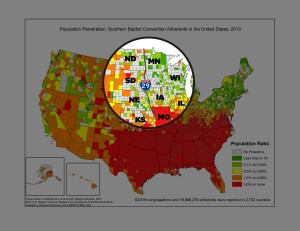 SIOUX FALLS, S.D. (BP) — A key shift in the funding relationship between the North American Mission Board and state conventions in NAMB’s South Region is making $1 million available to help start churches in strategic cities and towns along the I-29 corridor from Kansas City to Canada.
SIOUX FALLS, S.D. (BP) — A key shift in the funding relationship between the North American Mission Board and state conventions in NAMB’s South Region is making $1 million available to help start churches in strategic cities and towns along the I-29 corridor from Kansas City to Canada.
“I am grateful to our friends in the South [Region] state conventions who are making this shift so we can move money to start churches in areas where our presence is so minimal right now,” NAMB President Kevin Ezell said. “While NAMB’s primary focus is cities, we are still assisting plants in towns of all sizes all over North America where there is a need.”
The reallocation of funds from NAMB will be used to fund church plants and planters in cities like Sioux Falls, S.D., during the next four years. No city in the Midwest grew faster than Sioux Falls during the first decade of the 21st century. Forbes magazine calls it the best small city in the United States for new business and careers.
But with only six Southern Baptist churches in a metro area of more than 238,000 people, it’s also a critical mission field that could lead to greater Southern Baptist impact throughout one of the most unreached regions of the United States — the Upper Midwest.
“Sioux Falls is really a hub throughout the region,” said Buck Hill, state director of missions for the Dakota Baptist Convention who has served as an interim Sioux Falls pastor. “It’s the biggest city in the Dakotas,” Hill noted. “People come here to go to work in the technology field and then often move to other places throughout the I-29 corridor.”
The Upper Midwest historically has been difficult to reach for Southern Baptists. Of the 444 counties in the United States with no Southern Baptist churches, according to Southern Baptists’ Annual Church Profile (ACP) statistics from 2011, 60 percent are in the Upper Midwest states of North Dakota, South Dakota, Minnesota, Iowa, Nebraska, Missouri and Kansas. Many of those counties without an SBC presence are predominantly rural.
Members of the Heartland Interstate Strategy Task Force, which includes representatives from each state convention along the interstate, believe that Southern Baptists can begin to impact the entire Upper Midwest by planting multiplying churches in seven strategic hub cities along I-29 from Kansas City to Winnipeg, Canada.
“The idea is to strengthen those [hub] areas and then press east and west through church planting to try to enter into those rural and small-town counties all across the Upper Midwest,” said Leo Endel, executive director of the Minnesota-Wisconsin Baptist Convention who initiated early conversations about the I-29 need.
Mark Elliott, church planting catalyst and director of missions for the Eastern Nebraska Baptist Association, said early SBC efforts in the region focused mostly on congregationalizing transplanted southerners and often didn’t impact those who had lived there for generations. Many of these longtime residents immigrated to the Upper Midwest in the late 19th century and formed ethnic communities with strong relationships to specific religious traditions such as Catholicism and Lutheranism.
By far the largest state Baptist convention connected to the I-29 corridor is the Missouri Baptist Convention (MBC). Elliot said Missouri Baptists will play a critical role in the effort as a bridge between the South and the Upper Midwest. Midwestern Baptist Theological Seminary in Kansas City, Mo., also will have an important role by training future church planters for the region.
John Yeats, MBC executive director, sees the opportunity to reach the I-29 corridor as a strategic part of the convention’s vision.
“Missouri Baptist churches in conjunction with the MBC and oftentimes with their local associations are planting new churches in our state,” Yeats said. “However, our vision is beyond our borders. Our vision is to reach the heartland of this nation with the Gospel of Jesus Christ. That’s one of the reasons Iowa is a partner state with us and now we partner more strategically with our other state conventions in the Great Plains.”
Elliott said the partnership with Southern Baptists throughout North America through NAMB will be essential in impacting the hub cities in the region.
“We are very, very excited about the announcement [of the NAMB funds],” Elliot said. “That will move this ball down the field to reach a huge area of lostness in an underserved area with the Gospel of Jesus Christ.”
–30–
Tobin Perry writes for the North American Mission Board. Get Baptist Press headlines and breaking news on Twitter (@BaptistPress), Facebook (Facebook.com/BaptistPress) and in your email (baptistpress.com/SubscribeBP.asp).





